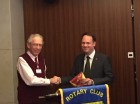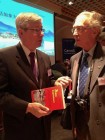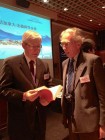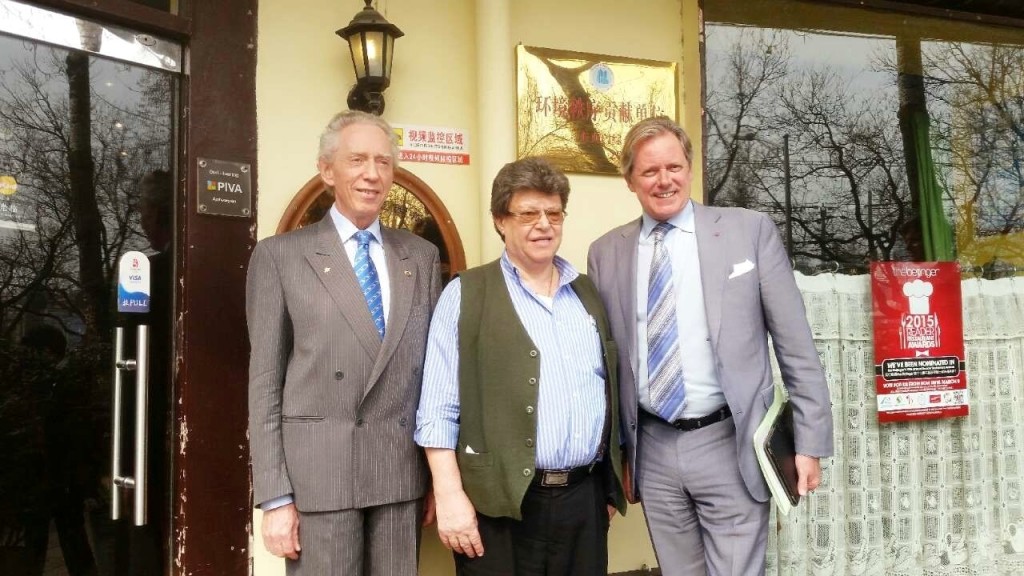On 18 March I had the privilege to attend an interesting overview on what Canada is doing and planning for this enormous region, called the Arctic.
Ambassador Guy Saint-Jacques invited us all you to a “Canada in Conversation event” featuring guest speaker, Dr. David Hik, Board of Directors Member, Canadian Polar Commission in conversation with moderator, Dr. Yang Huigen, Director General of Polar Research Institute of China on “Canada’s Arctic Science in an International Context: Innovations for a Changing Arctic in the 21st Century”
The new Canadian High Arctic Research Station (CHARS) Act is expected to come into force soon, making it the focal federal government organization for coordinating Arctic research in Canada. This will present on a number of opportunities to strengthen international cooperation in Arctic scientific research, and specific possibilities for enhancing Canada-China collaboration. Science, technology and relevant knowledge underpins all four pillars of Canada’s Northern Strategy – environmental protection, social and economic development, governance, and sovereignty. In addition, given the devolution of some federal responsibilities to local governments and various land claims obligations, the way in which Arctic research is conducted is changing, including greater involvement of Northern communities in decision-making. As China is strongly commitment to Arctic research, though a variety of ongoing university, laboratory and institute activities, the conversation will examine the structure and plans for facilitating international collaboration within the new CHARS and the possibility of implementing joint Canada-China research focused on changes in Arctic sea ice conditions, as well as other areas of potential collaboration.
A networking reception followed the talk at the Official Residence.
The Arctic merits indeed a lot of attention for many reasons, due to Climate Change, Warming of the Planet, the melting of the ice cap, the impacts on fauna, flora, fishing, coastal lines, shipping and so on. China is very interested in the subjects and is looking forward to work with Canada on further research.
I had also the pleasure to hand over my book “Toxic Capitalism” to the ambassador. The book also mentions the issues affecting the arctic.
It had been quite some time since I visited the embassy. I particularly enjoyed the relaxed atmosphere and cordiality.
See here the biography of the main speakers:
Dr. David Hik
Dr. David Hik was appointed to the Canadian Polar Commission’s Board of Directors in November 2010, and reappointed in November 2013. He has conducted research in Northern Canada since 1984, and his interests are focused on the ecology of tundra ecosystems in Arctic and mountain environments, social-ecological resilience, and the interface between science and policy. Dr. Hik is currently a Professor at the University of Alberta, and also a visiting guest professor at Polar Research Institute of China. He recently completed a four-year term as President of the International Arctic Science Committee (IASC) where he championed engagement of early career researchers, international partnerships, data management, and long-term planning for research coordination.
Dr. Hik currently serves as Vice-Chair of the Arctic Council’s ‘Sustaining Arctic Observing Networks (SAON)’ initiative; Chair of the 3rd International Conference on Arctic Research Planning (ICARP III); and Co-Chair of the International Polar Partnership Initiative (IPPI). Previously, he held the Canada Research Chair in Northern Ecology (2002-2012) and was Executive Director of the Canadian International Polar Year (IPY) Secretariat (2004-2009). He is a Fellow of the Royal Canadian Geographical Society and was awarded the Society’s Martin Bergmann Medal for Excellence in Arctic Leadership and Science in 2013.
Dr. Yang Huigen
Huigen Yang is the Director General of the Polar Research Institute of China (PRIC). Over his career, he has spent significant time carrying out Aurora observations at Syowa and Zhongshan Station in the Antarctic and Yellow River Station on Svalbard. During the 2007-08 International Polar Year (IPY), he acted as Chief Scientist of the IPY China Program. Dedicated to international cooperation, he is the Vice-President of the International Arctic Science Committee (IASC), and the national representative and council member of both the Science Committee of Antarctic Research (SCAR) and International Council for Science (ICSU). Dr. Yang was the leader of the 25th Chinese National Antarctic Research Expedition, 2008- 2009, during which the Kunlun Station at the top of Dome A was established. He also led the 5th Chinese National Arctic Research Expedition to traverse the Northeast Passage. He has built up intensive cooperation with Australia, Belgium, Canada, Chile, Iceland, Japan, Korea, Norway, United Kingdom, the United States, and other countries in the area of polar sciences, logistics cooperation, and education and outreach. Dr. Yang obtained his PhD in the field of the space physics in Wu Han University and completed a Post-Doctorate at National Institute of Polar Research (NIPR) in Tokyo.
(information all provided by the Embassy)



































